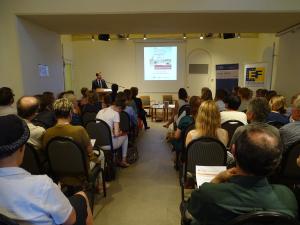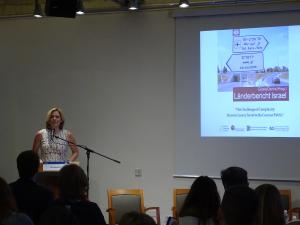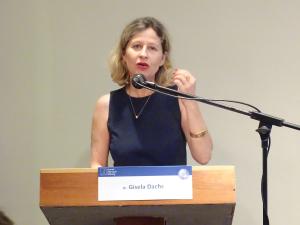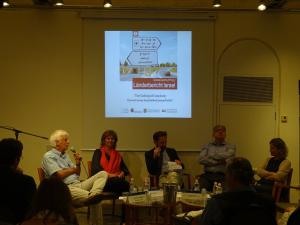In his welcoming address, Dr. Michael Borchard emphasized the partnership between KAS and the Federal Agency of Civic Education and the German Academic Exchange Service (DAAD). Julia Klöckner, federal deputy chairwoman of CDU, referred to the importance of the German-Israeli relations, but also pointed out the discrepancy between the mutual perceptions. Due to one-sided media coverage, the report would be highly relevant to prevent an unbalanced view on Israel from a German perspective. Dr. Christian Thauer, representative of DAAD, additionally underlined the economic link between Germany and Israel.
Jutta Klaeren and Hildegard Bremer presented the publication of the Federal Agency of Civic Education. By editing and providing a variety of both digital and print publications and by organizing study tours, the work of the Federal Agency of Civic Education focuses on promoting awareness for political participation and democracy in civil society. Jutta Klaeren emphasized the differences in German-Israeli relations which would inevitably occur as a result of plural societies. The “Länderbericht Israel” greatly contributes to the objective of showing these differences and of explaining the reasons.
The author of the report, Dr. Gisela Dachs, pointed out the changes in communication and information. The “Länderbericht Israel” would stand in contrast to the increasingly faster internet communication that was becoming even more compact and transient. This results in the necessity of a comprehensive work, that conveys the complex living conditions and everyday reality of Israelis. Dr. Dachs also focused on the independent meaning of the photographs completing the text on a more ambiguous basis and providing a larger scope of interpretation.
In the introduction of the following round table, the host Dr. Michael Borchard, discussed the cultural gap between the young and the old in both the Israeli and the German society. Whereas the German youth was post-nationalist, post-militarist and post-religious, the Israeli youth would be the direct opposite. For this reason, Dr. Michael Borchard determined the German and Israeli societies to be drifting apart instead of becoming closer.
Dr. Raef Zreik contributed to the “Länderbericht Israel” by writing the article “The disappearance from the landscape – thoughts on the public space of the Palestinians in Israel” (p. 228-242). The author argued that public space would be highly relevant for a state and would contribute to the development of a common identity, but would not be found for Palestinians in Israel. Due to Israeli spatial dominance and the lack of physical presence of Palestinians to create a shared consciousness, the development of a sense of identity would be prevented. Dr. Zreik considered the lack of a Palestinian sense of identity to be crucial. He also emphasized that the Middle East conflict needed to be examined equitably in Germany. The loss of complexity would result in the creation of a premature stigma of good and bad, being a threat also in intellectual circles.
Professor Dr. Moshe Zimmermann, author of the article “Sport in Israel” (p. 243-250) and “The German-Israeli relationship” (p. 615-642) answered the question about the significance of sport in conveying Israel to the German audience. He argued that sport reaches a broad public and that sport as a polarizing subject could also be a platform for debates on nationalism and racism. With reference to the comparison of reasonable criticism of Israel and antisemitism, Prof. Dr. Zimmermann distinguished a generalized hostile attitude towards Jews disregarding facts from legit criticism of the state of Israel. However, Professor Dr. Zimmermann stated that stereotypes would often be concealed with political criticism creating a secondary, hidden antisemitism. On the other hand, he observed that Israel would often be using antisemitism as an argument to reject legit critics.
Anita Haviv-Horiner emphasized the great significance of freedom of opinion in the dialogue. She referred to the Shoa as a reason for making the exchange between Israelis and Germans different from the exchange among Israelis. As Haviv-Horiner has already explained in her publication “Home? – Maybe. Children of Holocaust survivors between Germany and Israel” (2013), she considers “home” to be a complex concept – especially for those standing in between different cultures as it is often the case for Israelis.
Finally, the participants of the debate agreed that the “Länderbericht Israel” provides complex information in a comprehensible manner and succeeds in enabling a cultural dialogue. The Israeli culture should be “translated”, Dr. Dachs said. She also explained that a substantiated analysis of the interlinked structures can contribute to a deeper understanding as well as an increasing interest. Dr. Zreik outlined the different perceptions of Israelis and Germans becoming a big challenge regarding the German-Israeli relations. In addition, the fact that both societies are drifting apart would result in a decreasing interest in the opposite. The country report is considered to be a possibility to prevent this development on the German side.






